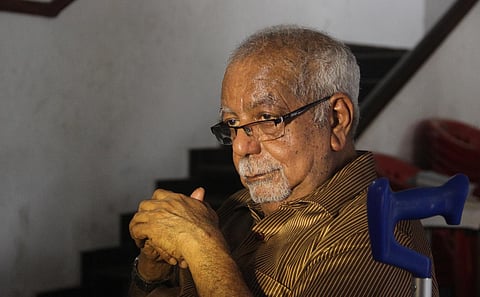

KOCHI: Born into a poor family in rural Tiruvalla, a young K G George used to travel to Kottayam to watch films, spending most of what he earned doing sundry jobs. “Those days, I dreamt of making great films like the ones I used to watch in cinemas. It took me several years to achieve my dream. I went to the film institute and met several people in the journey to realise it,” George says in the documentary ‘8 1/2 Intercuts — Life & Films of K G George’.
George, who passed away on Sunday morning, was a master storyteller who defined an era in Malayalam cinema. He was 77. George had not been well for some time, after a stroke left him debilitated and bound to a wheelchair. He breathed his last at 10.15 am at a care home near Kakkanad, where he spent the last five years of his life.
Kulakkattil Geevarghese George leaves behind an oeuvre of 19 films, each distinct in its narrative and content, that attempt to capture social and gender tensions like none before him. George, who considered Italian filmmaker Federico Fellini as his biggest influence, burst onto the film scene with his debut movie Swapnadanam (1975), which went on to win the national award for the ‘best feature film in Malayalam’.
“Swapnadanam amazed us all. The film gave a new grammar to Malayalam cinema. His grasp of the medium was there for all to see,” said filmmaker Adoor Gopalakrishnan in ‘8 1/2 Intercuts’. A slew of films followed, which are still considered essential reference points for upcoming filmmakers and students of cinema.
Some of his critically acclaimed films include Ulkadal (1979), Mela (1980), Yavanika (1982), Lekhayude Maranam Oru Flashback (1983), Adaminte Vaariyellu (1983), Panchavadi Palam (1984), Irakal (1986), and Mattoral (1988).
“At a time when Kerala films were drifting towards the razzmatazz of Tamil and Hindi movies, KG (and later Bharathan and Padmarajan) placed narrative as the keystone. To this day, Malayalam movies differentiate because of the edifice these maestros built in the 1980s,” writer N S Madhavan wrote on X, formerly Twitter.
Panchavadi Palam, which tells the story of village politicians plotting to construct a new bridge after razing down a perfectly serviceable bridge, is considered one of the best political satires of all time in Malayalam. As an investigative thriller, Yavanika, starring Bharath Gopi and Mammootty, has few equals Malayalam. The film, known for its gripping script, won the Kerala state award for ‘best film’.
His films were a blend of reality, wit and brazen self-indulgence
Irakal, an in-depth exploration of the psychology of violence, tells the story of a ruthless rubber-estate baron, Mathukutty (played by Thilakan), who flouts prevailing mores and spawns criminal sons as well as a promiscuous daughter, is known for its craft and story-telling. Irakal resonates even today. George used a new narrative technique in Adaminte Vaariyellu to tell the story of unhappy marital lives and oppression suffered by three urban women.
His films are known for their strong female characters. Through his movies, he tells us that they have the same virtues and vices as men, as depicted in Adaminte Vaariyellu, Mattoral and Irakal. After completing his diploma from the Pune Film and Television Institute of India (FTII), George started his film career as the assistant to renowned director Ramu Kariat. If the Pune Film Institute exposed him to the magic of cinema, his stint as assistant to the legendary Kariat in the celebrated film Nellu instilled in him that quality to jell cinematic norms with commercial elements.
His film Kolangal, also released in the 1980s, depicts the common romantic concept of an interior village in Kerala, with its virtues, happiness, as well as wildfire jealousy. With hints to the real-life suicide incident of a popular south Indian actress, Lekhayude Maranam Oru Flashback became controversial even before its release.
George, who won nine Kerala state film awards, leaves his own inimitable mark on Indian cinema, and his films were a blend of reality, wit and brazen self-indulgence. His last movie was released in 1998, Elavamkodu Desam, a period movie released when mimicry movies ruled the roost. “The audience somehow did not relate to this movie,” he once said. He is survived by wife, Selma, daughter, Thara George, and son, Arun. His funeral will be held on Tuesday.